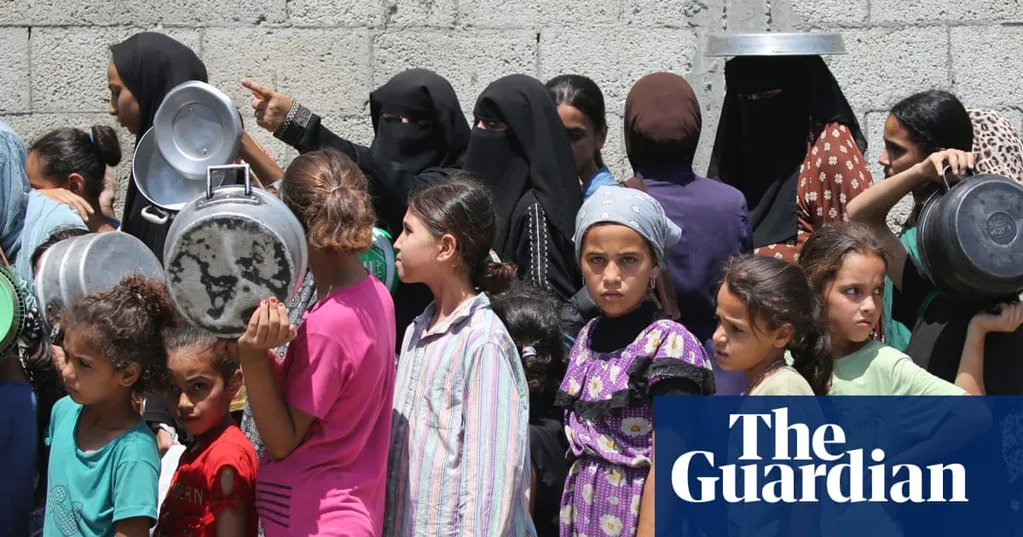An "entirely man-made" famine is taking place in Gaza's largest city and its surrounding area, UN-backed experts have declared, in an escalation in the devastated territory's humanitarian crisis.
The Integrated Food Security Phase Classification (IPC), a globally recognised organisation that classifies the severity of food insecurity and malnutrition, found that three key thresholds for famine had been met.
Only four famines have been declared by the IPC since it was established in 2004, most recently in Sudan last year.
"This famine is entirely man-made, it can be halted and reversed," the report says. "The time for debate and hesitation has passed, starvation is present and is rapidly spreading. There should be no doubt in anyone's mind that an immediate, at-scale response is needed. Any further delay - even by days - will result in a totally unacceptable escalation of famine-related mortality.
"If a ceasefire is not implemented to allow humanitarian aid to reach everyone in the Gaza Strip, and if essential food supplies and basic health, nutrition and [sanitation and water] services are not restored immediately, avoidable deaths will increase exponentially."
The IPC warned in July that a "famine scenario" was unfolding in parts of Gaza but had until now stopped short of making a formal declaration, citing a lack of hard data.
The organisation's new report formally declares a famine in and around Gaza City, the biggest built-up area of the territory and currently home to between 500,000 and 800,000 people, many displaced and homeless.
The report also declares that the towns of Deir al-Balah and Khan Younis in the centre and south of Gaza are likely to experience famine "in coming weeks".
The experts say the data is insufficient to declare a famine in the north of the territory, though aid officials say the conditions there are thought to be the most severe and have called for urgent steps to allow for a full humanitarian assessment.
In order to declare a famine, three strict criteria must be met: at least 20% of households face an extreme lack of food; at least 30% of children suffer from acute malnutrition; and two people for every 10,000 die each day due to "outright starvation".
The declaration of famine in Gaza will increase pressure on Israel to ease the tight restrictions it has maintained on supplies since the beginning of the 22-month-old conflict.
Amjad Shawa, the director of the Gaza NGOs Network, who is based in Gaza City, said: "This is the worst, the most critical stage in the entire history of Gaza, not just in this war. We are in a very complicated situation. We feel very sick and very tired. We must get food otherwise we cannot imagine what will happen."
Israel does not accept there is famine or widespread malnutrition among Palestinians in Gaza and is mobilising tens of thousands of troops for what it has said will be a massive operation in Gaza City within weeks.
Aid officials said any further offensives in Gaza would have catastrophic consequences for the population.
The Gaza Humanitarian Foundation (GHF), a new Israel-backed organisation supposed to replace aid groups that previously distributed food to much of the population in Gaza, is failing to distribute sufficient food.
The UN and other organisations face massive logistical obstacles including widespread looting due to an almost total breakdown of the rule of law, ongoing Israeli combat operations, Israel's administrative restrictions and bureaucracy and damaged infrastructure within Gaza.
The IPC report expresses grave concern at the continued and large-scale killing of civilians while trying to access food deliveries and the inadequate planning, implementation and monitoring of the privatised food distributions conducted by the GHF.
It calls for "urgent, comprehensive and sustained action to end the swiftly deteriorating and ever-expanding humanitarian catastrophe in the Gaza Strip".
According to figures from Gaza's health ministry, verified by the World Health Organization, deaths from malnutrition and starvation in Gaza have risen sharply. In the 22 months after the 7 October attacks by Hamas, 89 fatalities were attributed to malnutrition or starvation, mostly children under 18. In just the first 20 days of August there were 133 deaths, including 25 under-18s, the ministry said on Wednesday.
Israel disputes the hunger fatality figures given by the health ministry of Gaza's Hamas-run government, arguing that the deaths were due to other medical causes.
Israeli officials said more than 220 aid trucks entered Gaza through the Kerem Shalom and Zikim crossings on Thursday.
